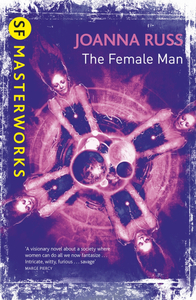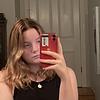You need to sign in or sign up before continuing.
Take a photo of a barcode or cover
This book looms large in modern science fiction (my copy is from the SF Masterworks series). It has a lot of fiercely interesting stuff, but I found it hard going. It doesn't have a plot so much as it has a premise that spins out into some vignettes, it leaps between narrators without necessarily letting you know who's talking, and in general it does everything possible to be Difficult. But on the plus side, it has some riotous observations on late 20th-century society, a fantastically imagined female-only utopian future, and a lot of sly humour.
Unfortunately some aspects have not aged well. There is one futuristic scenario in which men and women are waging open war on each other, so are living separately. The men still want to have sex with women, though, so they force some of their own to undergo surgery and hormone treatments to become ersatz women. No doubt it was intended as a satire on sexist men's simultaneous contempt for women and desperate need for them, but in 2020 it reads as transphobic.
I'm glad I read it, because I got a lot out of it and some of its imagery and ideas will linger with me. But I can't recommend it as a book to read for pleasure: this was very much work.
Unfortunately some aspects have not aged well. There is one futuristic scenario in which men and women are waging open war on each other, so are living separately. The men still want to have sex with women, though, so they force some of their own to undergo surgery and hormone treatments to become ersatz women. No doubt it was intended as a satire on sexist men's simultaneous contempt for women and desperate need for them, but in 2020 it reads as transphobic.
I'm glad I read it, because I got a lot out of it and some of its imagery and ideas will linger with me. But I can't recommend it as a book to read for pleasure: this was very much work.
Oh, wow! This book is amazing. Why haven't I read it sooner?
Thoughts:
You can write books like this?
Why don't more people write books like this? Why don't more people read books like this?
This makes me feel so much more normal and like it's okay that I'm here. (Okay, not about the book exactly and much more about me... but you know, these are thoughts...)
It really is quite funny. Brilliant humor, truly brilliant and incisive (crisp, clear, insightful, succinct, and powerful).
I did wonder when the story would develop. I would not always be able to read this story, depending on mood and patience levels. It is not an easy read, but it is rewarding.
Thoughts:
You can write books like this?
Why don't more people write books like this? Why don't more people read books like this?
This makes me feel so much more normal and like it's okay that I'm here. (Okay, not about the book exactly and much more about me... but you know, these are thoughts...)
It really is quite funny. Brilliant humor, truly brilliant and incisive (crisp, clear, insightful, succinct, and powerful).
I did wonder when the story would develop. I would not always be able to read this story, depending on mood and patience levels. It is not an easy read, but it is rewarding.
challenging
slow-paced
Plot or Character Driven:
Character
Strong character development:
Complicated
Loveable characters:
No
Diverse cast of characters:
No
Flaws of characters a main focus:
N/A
UGH.
This book had promise - and about 10% of it is good science fiction. The other 90% is unnecessary polemic, thankfully out-of-date (at least I hope so!) I don't object to her feminism so much to the way she doesn't go anywhere with it. "The Left Hand of Darkness" did a much better job of using science fiction to explore gender roles and identities.
That said, there are two, yes, two, awesome scenes, and for them alone I kept reading. The first is an interview of the Woman from the Planet of the Amazons by 60s America. The interviewer is darling in his uncomprehending as he asks if the women in Janet Eveson's world don't "miss" sex, and her blunt response that of course they have sex all the time. I also liked how she says she is married but they insist on calling her "Miss" because, of course, her lesbian marriage isn't recognized by them. I liked that. We were in-scene and getting the message.
I guess my complaint is, the story is complex, but rather than let it be told, Russ spends very little time IN STORY, rather summarizing plot for us among endless stream-of-consciousness meanders that I guess are supposed to be poetic but come off merely dull.
This book had promise - and about 10% of it is good science fiction. The other 90% is unnecessary polemic, thankfully out-of-date (at least I hope so!) I don't object to her feminism so much to the way she doesn't go anywhere with it. "The Left Hand of Darkness" did a much better job of using science fiction to explore gender roles and identities.
That said, there are two, yes, two, awesome scenes, and for them alone I kept reading. The first is an interview of the Woman from the Planet of the Amazons by 60s America. The interviewer is darling in his uncomprehending as he asks if the women in Janet Eveson's world don't "miss" sex, and her blunt response that of course they have sex all the time. I also liked how she says she is married but they insist on calling her "Miss" because, of course, her lesbian marriage isn't recognized by them. I liked that. We were in-scene and getting the message.
I guess my complaint is, the story is complex, but rather than let it be told, Russ spends very little time IN STORY, rather summarizing plot for us among endless stream-of-consciousness meanders that I guess are supposed to be poetic but come off merely dull.
challenging
slow-paced
Strong character development:
No
Loveable characters:
No
Diverse cast of characters:
No
Flaws of characters a main focus:
No
Very confusing book, couldn't get into it and was constantly confused about which character was which. Disappointed that this is the first sci fi book written by a woman and I didn't like it at all.
challenging
slow-paced
Plot or Character Driven:
Character
Strong character development:
No
Loveable characters:
No
Diverse cast of characters:
No
Flaws of characters a main focus:
Yes
Another book in my LGBTQIA speculative fiction reading challenge for 2023 and my fourth book out of six so far that has non-heterosexual reproduction in it (which in retrospect would have been the most specific of reading challenges!)
I'd been looking forward to reading 'The Female Man' for a long time. I knew of it's reputation as a feminist classic and when I was looking for books to read this year I think this was top 2 on my list. Sadly it's a real let down for me.
'The Female Man' is the story of four women who meet from sort of alternative universes on Earth and share their experiences. There is an exploration of the author's voice, a downtrodden woman from an alternate 1970's and two others from future utopias and dystopia (although the utopia whilst non-hierarchical still seems quite unpleasant, emotionless, boring and authoritarian).
The structure of the novel is unique with chapters ranging from a few pages to a sentence. Russ deliberately confuses the reader by switching perspectives every page (sometimes several times a page). It's interesting as a device, but the execution is lacking. The confusion just makes reading this short book hard work, and there isn't a pay-off of any kind. I went from 'this is interesting' to 'I want this book to be over' very quickly.
There is a lot of anger in this book, specifically about the role of women in society and how they are expected to conform to gender roles in a patriarchal society. There's rage, there's fire - it's a passionate invective against male society and gender oppression. I wish I could rate it more highly, because I am often more interested in the themes of a book than the story. I often found myself nodding along, or sharing Russ' anger or loving a wonderful turn of phrase. I carried on thinking, 'I should love this book,' but I just couldn't.
I think my main reasons for not enjoying the book beyond the structure is basically the story is wafer thin. After reading the book I am not sure there even was one. The characterisation is bland and appear as caricature. I get that is the point, but I just couldn't care less about any of the characters. I think if some of the chapters existed as a short chap book of essays or poems I'd have loved it, but this really isn't a novel for me.
Many of the reviews answer the question, 'but is this dated?' and one will find differing views. My view is that whilst some of the setting is dated, and some of the material conditions of women (in the UK at least) are different (especially in the employment market), basically nearly fifty years on we still live in a patriarchal society. Women and girls are still at risk of sexual violence, they are still objectified and still denigrated at any expression of female support and solidarity. In much of the world women are not in control of their bodies, or can vote, or take part in society. I was thinking about the women and girls in my life and my friends and reflecting on how much of the book is still relevant. I wish we could view the sexism and misogyny in here as a historical event, but it isn't. It's terribly sad that we can't say Russ' book is dated.
I should add that one way in which the book is dated, is it is incredibly transphobic. I'd like to think if Russ was alive and wrote the book today it wouldn't be in there. I get what she was trying to achieve mirroring the objectification of women but it was quite uncomfortable to read.
A good idea, saying mostly the right things, but sadly not a good novel.
I'd been looking forward to reading 'The Female Man' for a long time. I knew of it's reputation as a feminist classic and when I was looking for books to read this year I think this was top 2 on my list. Sadly it's a real let down for me.
'The Female Man' is the story of four women who meet from sort of alternative universes on Earth and share their experiences. There is an exploration of the author's voice, a downtrodden woman from an alternate 1970's and two others from future utopias and dystopia (although the utopia whilst non-hierarchical still seems quite unpleasant, emotionless, boring and authoritarian).
The structure of the novel is unique with chapters ranging from a few pages to a sentence. Russ deliberately confuses the reader by switching perspectives every page (sometimes several times a page). It's interesting as a device, but the execution is lacking. The confusion just makes reading this short book hard work, and there isn't a pay-off of any kind. I went from 'this is interesting' to 'I want this book to be over' very quickly.
There is a lot of anger in this book, specifically about the role of women in society and how they are expected to conform to gender roles in a patriarchal society. There's rage, there's fire - it's a passionate invective against male society and gender oppression. I wish I could rate it more highly, because I am often more interested in the themes of a book than the story. I often found myself nodding along, or sharing Russ' anger or loving a wonderful turn of phrase. I carried on thinking, 'I should love this book,' but I just couldn't.
I think my main reasons for not enjoying the book beyond the structure is basically the story is wafer thin. After reading the book I am not sure there even was one. The characterisation is bland and appear as caricature. I get that is the point, but I just couldn't care less about any of the characters. I think if some of the chapters existed as a short chap book of essays or poems I'd have loved it, but this really isn't a novel for me.
Many of the reviews answer the question, 'but is this dated?' and one will find differing views. My view is that whilst some of the setting is dated, and some of the material conditions of women (in the UK at least) are different (especially in the employment market), basically nearly fifty years on we still live in a patriarchal society. Women and girls are still at risk of sexual violence, they are still objectified and still denigrated at any expression of female support and solidarity. In much of the world women are not in control of their bodies, or can vote, or take part in society. I was thinking about the women and girls in my life and my friends and reflecting on how much of the book is still relevant. I wish we could view the sexism and misogyny in here as a historical event, but it isn't. It's terribly sad that we can't say Russ' book is dated.
I should add that one way in which the book is dated, is it is incredibly transphobic. I'd like to think if Russ was alive and wrote the book today it wouldn't be in there. I get what she was trying to achieve mirroring the objectification of women but it was quite uncomfortable to read.
A good idea, saying mostly the right things, but sadly not a good novel.
challenging
dark
reflective
tense
medium-paced
Plot or Character Driven:
A mix
Strong character development:
Complicated
Loveable characters:
Complicated
Diverse cast of characters:
No
Flaws of characters a main focus:
No
dark
mysterious
reflective
slow-paced
Plot or Character Driven:
A mix
Strong character development:
Complicated
Loveable characters:
Complicated
Diverse cast of characters:
No
Flaws of characters a main focus:
Complicated
challenging
informative
reflective
slow-paced
Plot or Character Driven:
Plot
First half is like two stars and the last fourth is four stars so I guess it gets three?
Russ really said kill all men huh. Good for her
Russ really said kill all men huh. Good for her



